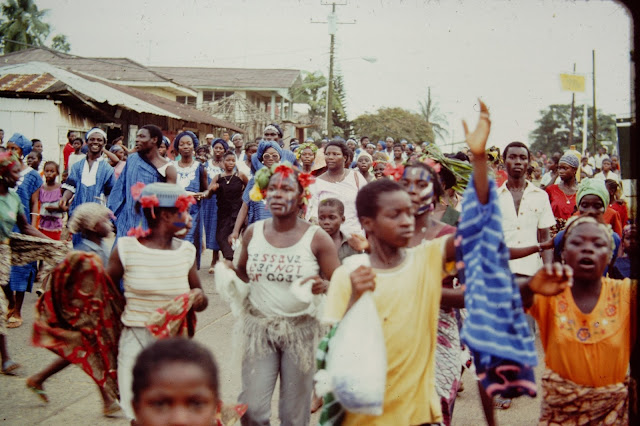 |
| Graduate on parade in Buchanan c. 1977 |
Graduation Day and/or Senior Day in Liberia is much like a holiday. Graduates get gifts, there are parades; people dress up in costume and paint; there is singing and dancing and partying and feasting. These Liberian traditions of celebrating Graduation Day seem to tie into some of the Poro and Sande graduation ceremonies while also incorporating some Western influences from the "Settlers" as well. They are so enmeshed I'm not sure I can separate out the two influences anymore than one could separate the influences upon Mardi Gras in the US Gulf South. In fact, while participating in Liberian graduation ceremonies in 2011 I was reminded of the Krewes and parades of the Louisiana Carnival season of which I had observed with curiosity first hand while living there. Surely the African culture played a significant role in the development of US Mardi Gras along with the Native Americans and the Europeans. But back to Liberia...
 |
| Liberian revelers decked out for Graduation/Gala Day in Buchanan, Liberia c. 1977 |
 |
| Graduation or Gala "Queen" on her float in parade through streets of Buchanan c. 1977 |
When I lived in Liberia in the 70's and 80's there was a different way that Liberian's celebrated Graduation Day and that seems to have changed. In those days the graduates would parade through town dressed in a "military-style" costume. This militaristic posing no longer dominates the graduation and gala day ceremonies in Liberia. This is an understandable change. You see, the demonic tsunami of death and destruction that ravaged Liberia throughout the 90's and up till 2003 was also dressed up in military garb and lingo. Warlords called themselves 'general' so and so and dressed the part while also costuming out their posses of death with military uniforms as they were able. The soldier became something to dread and fear and run from and lost any appeal it may have previously held in the mind of Liberians. In other words, soldiers are not as "in vogue" in Liberia as they used to be.
What remains of these ceremonies are the colorfully painted family groups that march through town and disrupt traffic and oftentimes the actual ceremonies themselves. In the States we urge the audience to refrain from clapping until everyone has received his or her diploma. An occasional air horn and/or drunk dad sounds out even in our ceremonies and we typically shake our heads and smirk while waiting for "our" graduate to cross the platform so we can perhaps let out a little yelp of our own. Our traditions do not allow anything that would completely overrun the ceremony itself. This is not necessarily true in Liberia anymore and something that has also changed in her culture.
Of the two graduation ceremonies I attended in Buchanan there was shouting and mobs of people running up to the front to carry off their graduate all through out. The speech of the Dux (Valedictorian) and the names of other graduates were often not even heard announced amongst the noise. This is not how graduation ceremonies were before the Civil Wars but it has become more the norm. I would feel comfortable describing these new sort of "ceremony" as organized chaos hanging by a thread. Throngs of people swarmed up and down the aisles and crowded the stage and even shouted down a school leader for not adequately paying the teachers or holding back their child's diploma. It was rather intense to say the least!
Graduates in "military-themed" uniforms march in Buchanan c. 1977
 |
| Graduation Band marches through Buchanan with the crowd "second lining" the ceremony sans umbrellas c. 1977 |
 |
| Family and friends parade to the ceremony with singing and dancing |
 |
| Undergraduates awaiting the beginning of the ceremony |
 |
| Graduates ready to enter the building for the ceremony |
 |
| Graduates embrace family and friends outside after the ceremony |
Outside the ceremony itself are even more family members and revelers waiting for their graduate to emerge. They are often painted in school colors and decorated with palm branches. They also like to hit metal cans or jugs or drums and chant and dance around the graduate. There is a definite festive mood in the air! Our vehicle was stopped en route to one ceremony by a group of partiers that actually started yelling and banging on our vehicle. However, the smiles and laughter on their faces communicated that this was a celebration and not a riotous mob. It was right on the line between sheer terror and joy for me, much like many things are to the foreigner visiting Liberia.
 |
| Graduation/Gala Day parade in Buchanan c. 1977 Liberia Christian High School |
All in all the day or days of Graduation are marked with festivities and merriment. Graduates are given gifts and lauded by relatives. People are proud of their graduates and the graduates are all smiles at the attention. The obstacles they have overcome in getting their education is indeed something to celebrate and the lessons they have learned in the process are more than "book". May Liberia continue her proud tradition of celebrating those that seek education and may those that receive it give back to the communities that gave them the opportunity. Blessings on Liberia!
 |
| The Queen rides through Buchanan c. 1977 |
 |
| Loading up in a truck for Graduation Parade, Buchanan, Liberia c. 1977 |
 |
| Dressed up and ready to party - Buchanan c. 1977 |
 |
| Smiles and shouting! |
 |
| The Queen makes her way through Buchanan, Liberia c. 1977 |
 |
| You know its a party when the band starts! Buchanan, Liberia c. 1977 |


